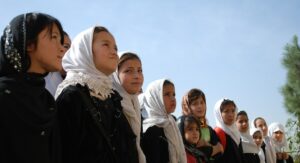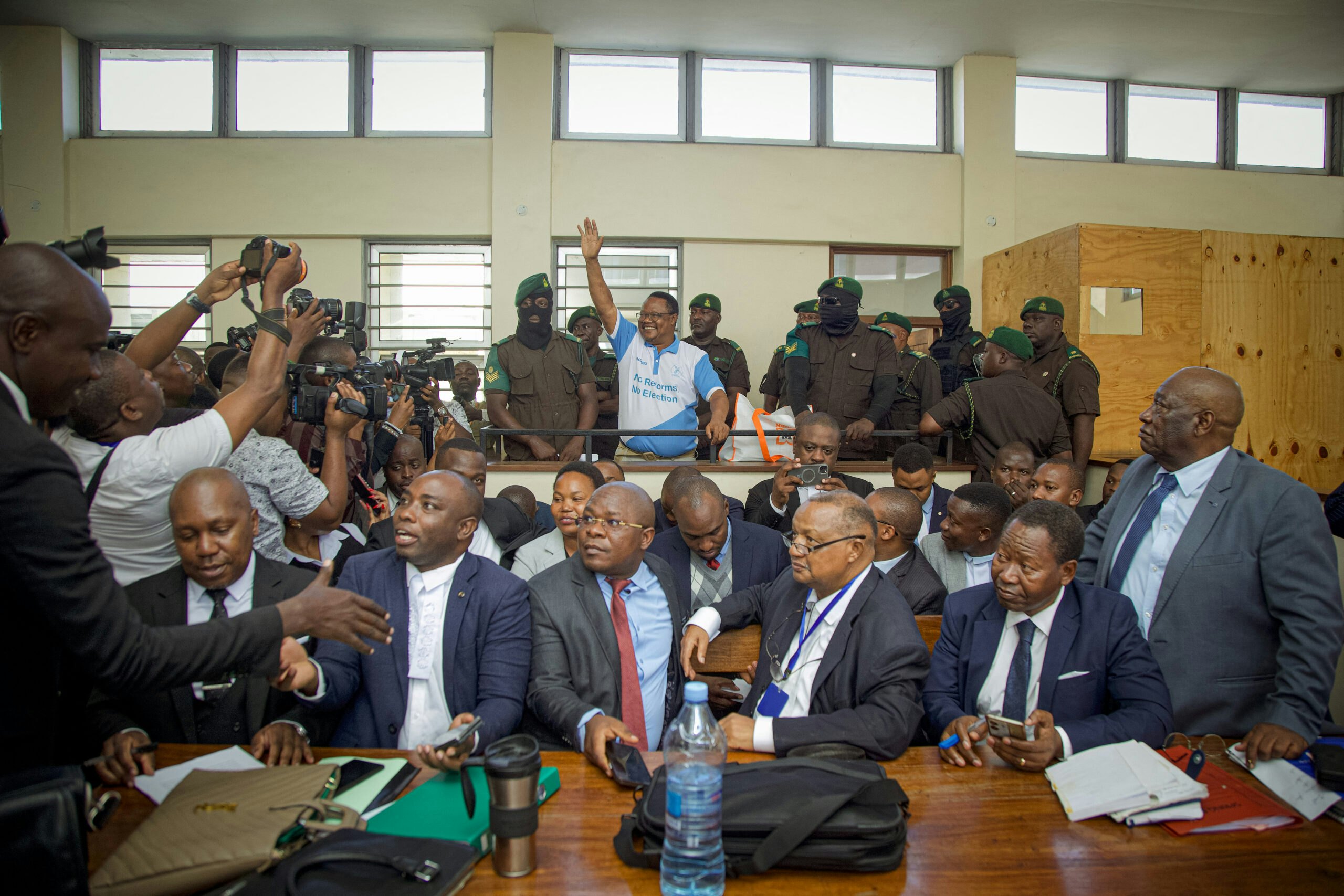The United States and the international community must act to protect the health and safety of those vulnerable to the Taliban, especially women and girls.
Many Afghans are trapped, with few opportunities to escape the Taliban. Despite our withdrawal, the U.S. government still has a role to play in Afghanistan to assist our allies and others vulnerable to the Taliban, especially women and girls.
Download Printable Version of the Report (PDF)
Washington and its allies should adopt appropriate policy changes to help these individuals and their families find a way out of the country. Once they are safe, both the public and private sectors can help them rebuild their lives.
Millions of Afghans will have no options to leave Afghanistan in the coming months. The international community must act on their behalf to protect their health and safety under the depraved rule of the Taliban.
Solutions exist. The administration, Congress, the international community, and the private sector must each do its part to ensure success.
Why This Matters Now
Women and children typically shoulder a disproportionate burden of suffering in the face of conflict and humanitarian crisis, and we’re already seeing this in Afghanistan.
Policy Recommendations
In January, the Bush Institute released its 2021 domestic and global policy recommendations rooted in principles of freedom, opportunity, accountability, and compassion.
Many women’s rights advocates and other at-risk Afghans have been unable to find safe passage out of Afghanistan. There is virtually zero access to asylum in bordering countries. And serious barriers exist to obtaining a visa to escape to other regions because the United States and Western allies no longer provide embassy and consular services in Afghanistan.
There is confusion over U.S. immigration processes, including qualification guidelines for Special Immigrant Visas, Priority 1 (P-1) and Priority 2 (P-2) refugee status, and humanitarian parole. Additionally, Afghans trying to seek protection in the United States face monthslong – and even yearslong – processing periods during which they often can’t obtain resources or protection of basic rights.
For Afghans unable to leave, scarcity of food, water, and basic health care as well as looming economic collapse make the struggle to survive incredibly difficult. Already, at least 1 million Afghan children are at risk of severe acute malnutrition and could die without access to lifesaving treatment, according to UNICEF.
The Taliban have already demonstrated their egregious disregard for human dignity. Let’s not do the same thing through inaction.
Afghan women and girls achieved more in 20 years than many women’s movements accomplished over decades. Their influence on democracy, peace, and stability benefitted the region and the security of the United States and the world. Afghan women and girls’ tenacity and dedication to a brighter future for their families, their communities, and their country stand as testaments to what could have been.
The policy solutions below are designed to address acute issues facing vulnerable Afghans both at home and in the U.S. immigration system. No single solution will fix every problem. But, together, they will address the immediate challenges.
Related
In 2019, the Bush Institute released a paper highlighting the gains women have made in Afghanistan in the last 20 years as well as a series of recommendations to protect these gains.
Recommendations for
THE ADMINISTRATION
The White House and the Department of Homeland Security should use executive authority to implement a special parole program for at-risk Afghans.
This would allow the United States to clearly define who qualifies for protection rather than forcing all applicants to use the one-off humanitarian parole application process through U.S. Citizenship and Immigration Service (USCIS). Parole authority has been used many times before, including for Filipino World War II veterans, Cubans and Haitians, and Central American minors.
For Afghanistan, a special parole program might include protections for women’s rights activists, journalists, religious minorities, university students, employees of U.S. and internationally funded projects, and others. The parole authority in the Immigration and Nationality Act is broad. The administration should identify those they consider to be vulnerable and utilize this power to reduce bureaucratic hurdles to their safety.
The administration should undertake a modernization and digitization effort across agencies that process immigration applications.
Electronic filing of applications, remote consular interviews, and other modernization efforts can reduce backlogs, decrease wait times, and solve some very practical issues facing Afghans attempting to leave their country.
USCIS has needed to digitize its many forms for years. But the evacuation from Afghanistan, and the rush to file humanitarian parole applications, has turned an inconvenient burden into a potentially deadly wait. Right now, at-risk Afghans, including Special Immigrant Visa applicants and their families, vulnerable women, students, activists, journalists, and others targeted by the Taliban have no way to obtain U.S. consular or embassy services.
The Taliban are preventing any Afghan without a valid visa from leaving the country. But to receive a valid visa, Afghans must sit for consular interviews to finish their application processes. Remote consular interviews, even if only used for low-risk applications, would allow these Afghans to receive diplomatic services without sacrificing the important security vetting done for each visa application. Electronic filing will have benefits across the legal immigration system, and it will help ensure efficiency and access in any potential future humanitarian migration situation.
The Departments of State and Homeland Security must commit to robust and transparent data collection, disaggregation, and dissemination regarding Afghan evacuees and parolees.
While we know that over 100,000 individuals in total were evacuated during the international airlift, further details remain elusive or nonexistent, hindering resettlement efforts. We cannot properly mobilize solutions if we don’t know the scope, scale, and intricacies of the challenges at hand and the populations we aim to support.
While we believe the vetting of Afghan evacuees is robust and secure, both the State Department and Department of Homeland Security need to be transparent about the process. Transparency will engender increased trust with Congress and the American people, increasing support for the important resettlement and adjustment efforts that will need to be made to assimilate Afghans in the coming months.
The administration should implement in-country processing for Afghans who qualify for Priority 2 refugee status.
The administration recently released the President’s Report to Congress on a proposed refugee ceiling for fiscal year 2022. It contained some excellent developments, including a substantially increased refugee ceiling and a private sponsorship category for refugees. But the president did not outline a plan to allow Afghans who qualify for Priority 2 (P-2) to access in-country processing.
To be sure, there are practical hurdles to implementing this for Afghans, like the lack of an embassy or consulate. And changing the existing regulations would require going through the lengthy federal rulemaking process. But obtaining P-2 takes a long time – at least a year – and undoubtedly some of the paperwork on these Afghans could begin before they safely arrive in a third country.
CONGRESS
Congress should appropriate funding to ensure resettlement of Afghan parolees and fund USCIS.
Unlike refugees and Special Immigrant Visa holders, parolees do not have access to a formal resettlement process or funds. Resettlement provides a proven on-ramp for newly arrived refugees to rebuild their lives. Afghans evacuated and granted parole, including those who may escape Afghanistan in the coming months, should be provided a similar opportunity to successfully start over in the United States.
Congress should also appropriate funding for USCIS. USCIS is traditionally a fee-funded agency rather than one receiving federal appropriations. Unfortunately, this leaves the agency vulnerable to being underresourced. Currently, USCIS is understaffed and woefully behind on many fronts. Appropriating funds for USCIS could help the agency clear the backlogs on humanitarian parole, green cards, DACA, and other programs. Additional staff could reduce the pressure on individual employees of the agency to conduct robust vetting, ensuring vetting remains secure.
Congress should expand P-2 Afghan refugee designations to encompass additional vulnerable women, including those who worked for intergovernmental organizations and other global institutions.
Priority 2 (P-2) allows the Department of State to designate eligibility for groups of special concern for refugee resettlement in the United States. Under existing guidelines for Afghans, many women who are at risk due to their efforts to support democracy, security, and development are excluded from current consideration, despite their hard work and valiant contributions that directly benefited American interests.
Moreover, P-2 for Afghans launched in early August, giving at-risk women – even those qualified – limited time to identify themselves, let alone to receive prospective and necessary application information from designated referral agencies. Expanding who qualifies for protection under the P-2 designation could offer an opportunity for women who did vital work over the last 20 years but have few options for refuge.
Congress should pass legislation allowing Afghan parolees to bypass the backlogged asylum system and apply for green cards.
Afghans arriving in the United States for resettlement qualify for a variety of immigration statuses, including Special Immigrant Visas for some and Priority 2 (P-2) refugee status for others. But because of backlogs and bureaucratic delays, nearly all will be processed under parole, whereby they will be vetted and then most likely enter an already stressed asylum system.
Afghan parolees shouldn’t further burden a system that already has a wait time of several years because of the increase in asylum seekers at the U.S. southern border over the past few years. Legislation that allows Afghans to apply for green cards sooner and provides a defined timeline for all Afghans who qualify will help them assimilate and integrate more quickly. It will also avoid creating additional problems for the asylum system.
THE UNITED NATIONS AND OTHER INTERGOVERNMENTAL ACTORS
The United Nations and international donors should quickly mobilize and sustain humanitarian aid into Afghanistan, particularly to meet the acute needs for food and medical supplies.
While thousands of Afghans may flee in the coming months, millions more will remain in country. All will be vulnerable to the already accelerating humanitarian crisis. The Taliban will be unable to effectively function as a government. The Afghan people should not suffer unnecessarily due to their incompetence and unwillingness.
Intergovernmental organizations and established nonprofits with a longstanding footprint in the country have the ability to mobilize and scale their efforts. Intergovernmental actors and donor countries should prioritize, expand, and sustain direct aid to these institutions to support the basic needs and well-being of vulnerable populations (which include children and women).
The United Nations should establish a humanitarian corridor out of Afghanistan for those who remain at imminent risk.
One of the most serious barriers to safety for at-risk Afghans is they lack access to a safe passage out. The United Nations has the ability to address this challenge and has done so in the past. The absence of a humanitarian corridor has been and remains one of the most serious hurdles to protecting at-risk Afghans.
Intergovernmental organizations should work closely with other nations in the region to ensure borders remain open, asylum is available, and refugee conventions are followed.
The ability to seek refuge is a universal human right that must be preserved. The United Nations High Commissioner for Refugees should move quickly to resettle Afghans who manage to make it to a safe third country in the region to lessen the real financial and resource pressures on these nations.
The United Nations must uphold the protection of individual rights, well-being, and agency of Afghan women and children.
Both Afghan families who have fled and those who remain in Afghanistan are likely to have difficulty accessing birth registration under the Taliban. But Afghan children born in third countries in particular should be assured of their rights to birth registration and citizenship, which are key to identity and the ability to obtain important governmental services later in life. The UN must advocate on behalf of these children and families to ensure that they will not become stateless.
How You Can Help

CORPORATIONS AND INDIVIDUALS
Corporations and individual donors should directly invest in both refugee resettlement efforts and humanitarian assistance initiatives.
This includes financial resources, in-kind contributions, and volunteer support. The private sector plays an important role in the assimilation and integration of immigrants and refugees. Afghans resettling in the United States over the next several months will need financial resources, job opportunities, housing, mental health and trauma support, and other guidance to help them adjust to life in the United States. Perhaps most importantly, they will need our welcome and friendship. Organizations have been hard at work both to support resettlement efforts and humanitarian needs in country. And the recently launched Welcome.US campaign highlights timely ways we can all assist those who stood with us and our core ideals as Americans.
CONCLUSION
The future of the Afghan people, both those evacuated and those who remain, will depend in part on the joint efforts of the U.S. government, the international community, the private sector, and ordinary Americans committed to the welcoming effort. We know what success looks like on humanitarian migration and humanitarian assistance. We must work together to implement the policies that will help us achieve that.
































